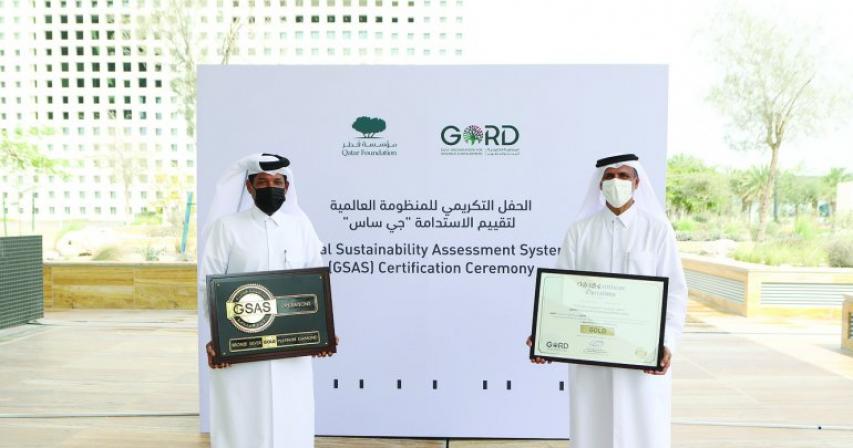Qatar Foundation’s HQ awarded for sustainability
- 4 years ago

Qatar Foundation’s headquarters – the 2015 building at Education City – has been awarded a top regional sustainability ranking from the Gulf Organisation for Research & Development (GORD) for setting an example of how a building can be operated in an eco-friendly way.
The building received the Global Sustainability Assessment System (GSAS) Operations Certificate from GORD with a ‘gold’ rating after being assessed by sustainability experts, reflecting Qatar Foundation’s (QF) role as a leader of sustainability and its efforts to reduce the carbon footprint of its own environment.
Founding Chairman of the Gulf Organisation for Research and Development, Dr. Yousef Alhorr, said: “When it comes to green building certifications, we see that the focus of project owners and developers is largely on meeting sustainability standards in design and construction stages only.
“While these efforts are praiseworthy, it is not the end but only the beginning of a project’s journey towards sustainability. In reality, a project’s overall carbon footprint is defined by the design, construction and operations stages combined, and the largest part of it in relation to the age of the buildings is determined by how they are operated and managed.
Executive Director of City Operations, QF, Hamad Mohamed Al Kuwari, said: “From its first day of operation, QF has been dedicated to ensuring that the 2015 building is an exemplar of sustainability — not only in its design, but in how it is run and how it is used.
“Even buildings which have the highest standards of sustainable design can only truly be environmentally-friendly, and educate people about the importance of sustainability, if they are continually operated as a green building. QF’s commitment to both practicing and promoting sustainability is illustrated through the way in which we continue to operate our headquarters, from its use of energy and water to the measures we have implemented to manage waste.
“We are delighted that these efforts to make the 2015 building a standard-bearer for sustainable operations have been recognized through the awarding of the GSAS Operations certification from GORD.”
GSAS is the MENA region’s first green building certification system that assesses and guides projects on how they reduce their environmental footprint during the design, construction and operation stages.
Its Operations scope focuses on the impact of buildings once occupied, as their operational and maintenance practices have a direct impact on the natural environment, the economy, and people’s health.
The GSAS Operations certification program aims to lessen a building’s environmental footprint while also improving the wellbeing of its occupants.
The 2015 building has 11 storeys and a total floor area spanning 27,366 sqm, accommodating numerous QF departments and executive offices. Designed with sustainability and energy efficiency in mind, the operations and maintenance of all its facilities were thoroughly analysed before it received its Gold rating for the GSAS Operations certification, which is valid for four years.
To achieve this rating, the building was evaluated in six categories: energy performance, indoor environment, waste management, facility management, water performance, and environmental policy and awareness.
The assessment included thermal imaging analysis of the building envelope, energy and water labelling, indoor environmental quality analysis, and techno-commercial analysis of its energy management opportunities. Additionally, the building’s indoor environmental quality and waste and facility management practices were assessed and found to be in line with industry standards.
Comments